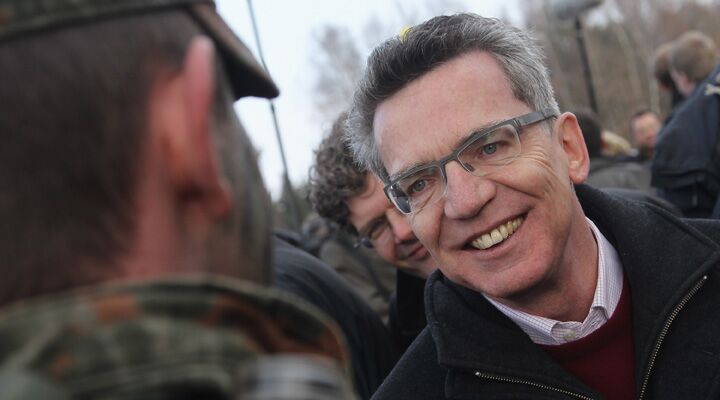
What Guttenberg Started, de Maiziere Finishes
During his term as Germany’s defense minister, Karl-Theodor zu Guttenberg introduced the concept of radical change of Germany’s military force. Most controversial of all was his doing away with conscription—the traditional way of providing Germany with a defensive army since rearmament under the Western Allies’ approval following World War ii—and its replacement by an entirely professional outfit of volunteer soldiery.
The idea met with a lot of criticism during Guttenberg’s term in office. Yet now it is being embraced, along with other Guttenberg initiatives, as binding federal government policy.
Recently a rash of reports commissioned by the German government and the European Union have been publicized, all geared toward recommendations of leaner, meaner, better coordinated and consolidated European military forces and defense industries.
The emphasis is on a “high tech” approach to defense. Cyberwarfare, death rays capable of massive destruction, and cutting-edge developments in munitions have all been on the table for discussion by both German and EU defense experts in the process of producing these reports, published over the past few weeks.
Today, the combined military forces of EU nations make the European Union as an entity the second-greatest military power on Earth. It goes without saying that the strongest military power today within the EU is Germany. Thus it is axiomatic that any strength of leadership in a consolidated EU military will be Germanic.
Germany has come a long way since playing second fiddle to the U.S. in European defense both preceding and following unification, up to now.
But now, with U.S. defense focusing away from Europe and its periphery to concentrate on the Far East, Germany, followed by the EU, is picking up the ball for defense outside the European continental perimeter and increasingly focusing on the nations to its south and east.
“The time of planning, guidelines and draft projects is over,” declares the most recent report on the Bundeswehr. “The time has come to change the German military, the report said” (Deutsche Welle, May 16).
DW further states that “The reform of the German military is the most radical overhaul of the Bundeswehr in its history. … A new field will be a division for strategic intelligence (ksa) to launch attacks via the Internet. The Bundeswehr would thus be able to join the cyberwar with computer worms and viruses.”
The recommended new force structure for the Bundeswehr is for “troops ready for rapid intervention missions led by nato or the EU” and for highly professional units able to be launched at short notice as part of EU expeditionary forces (ibid).
These recommendations dovetail neatly with similar recommendations made in the recently released report for overhaul of all EU military forces put forward by the European Institute for Security Studies, commissioned by the chairman of the EU Military Committee.
Those opposing the mooted radical changes in Germany’s defense posture claim that “the overhaul of the troops as they see it [is] a move away from a defensive to an intervention army” (ibid).
They are right.
We have waited for the past 20 years, since German reunification, for the wolf to bare its teeth. Now the wraps are off, and the true nature of German militarism is speedily arising for a third time in a century.
The report indicates that “Barring changes to the national security situation, the Bundeswehr restructuring is to be completed by 2017” (ibid).
The risk is that, amid the continuing euro crisis, “changes to the national security situation” could result in this timetable being rapidly speeded up, rather than slowed down.
The overall emphasis in both the EU report and the report on the Bundeswehr is that officially the deployment of their forces beyond the European sphere is to be billed as “peace keeping” initiatives.
The grave danger in describing overt military missions as such is bound up in one singular prophecy for our times: “For when they shall say, Peace and safety; then sudden destruction comes upon them, as travail upon a woman with child; and they shall not escape.”
